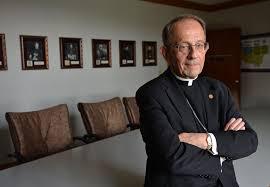|
Erie’s Persico says pope gave ‘green light’ to reforms
By Ed Palattella
“The pope is very clear,” Erie bishop also says of landmark papal summit on clergy abuse. “He wants progress on this. He wants something concrete.” Erie Catholic Bishop Lawrence Persico said he is ready to restart an effort with colleagues to further address the clergy sex-abuse crisis in the United States. The go-ahead, Persico said, came from Pope Francis, who on Sunday ended an unprecedented Vatican summit on clergy sex abuse by declaring “an all-out battle against the abuse of minors” within the Roman Catholic Church and beyond. Though abuse victims criticized Francis for failing to propose measures of his own, Persico said the pope gave responsibility for developing new rules to bishops’ groups worldwide, including the U.S. Conference of Catholic Bishops. The Vatican frustrated Persico and others this past fall when the Holy See asked the conference to hold off on passing new regulations until Francis held the global meeting on abuse. With that four-day session over, Persico said, the U.S. Conference of Catholic Bishops is set to resume its work, with the Vatican to review its proposals later. “The pope is very clear,” Persico said on Monday. “He wants progress on this. He wants something concrete and he wants effective measures. So I think now this is the green light.” Persico said he believes the Vatican will be inclined to approve what the American bishops develop, including ways to discipline abusive bishops or bishops who covered up abuse. The final authority for punishing a bishop will remain with the pope, but the new rules are designed to give bishops more of a role in policing themselves. If the Vatican is slow to approve the American proposals, Persico said, it risks even more of a backlash. Victims and others have advocated for change since the Aug. 14 release of the Pennsylvania grand jury report on clergy sexual abuse in the Roman Catholic Church in Pennsylvania. The report cited Persico’s efforts to address the crisis. In April, he ordered the release of the 13-county Catholic Diocese of Erie’s first list of priests and laypeople credibly accused of abuse since the 1940s. “It’s like somebody said, ‘It’s a large ship and to turn it around takes time,’” Persico said of the Catholic Church. “But at least it’s on people’s radar. And I think there will be enough pressure to expect results. And I think the American bishops know that.” As for the Vatican’s response to the American bishops’ proposals, “I’m still of the mind of wait-and-see; cautious optimism,” Persico said. “I want to see what is said and what is proposed to see if it’s concrete and a clear direction to follow for everyone. Because if we keep spinning our wheels, the people are just going to get more disgusted and angry.” Victims advocates are already angry at the outcome of the pope’s summit. One of the largest of the groups, the Survivors Network of those Abused by Priests, said it wanted Francis to, among other things, fire bishops or cardinals who covered up clergy sexual abuse and develop punitive measures for those involved in future cover-ups. “Until these actions take place, children are not safe within the Catholic Church,” said Judy Jones, of St. Louis, who is S.N.A.P.’s Midwest regional leader and who visited Erie after the release of the grand jury report in August. “For victims, this papal summit was not a success. It was only more words with no actions.” Persico was not in Rome for the summit. The pope summoned 190 Catholic bishops and religious superiors who are presidents of the local bishops conferences worldwide, such as the U.S. Conference of Catholic Bishops. Persico is a member of the conference’s administrative committee, which he said will meet in Washington D.C., on March 11 in advance of the conference’s spring national meeting in Baltimore, in June. Persico said the bishops at the June meeting likely will revisit proposals that they started to develop at the conference’s fall national meeting in November, also in Baltimore. Many U.S. bishops, including Persico, wanted to leave the November meeting with a plan of action, similar to what occurred when the bishops met over the abuse crisis in Dallas in 2002. But the Vatican’s intervention halted those initiatives, until now. The pope’s delegation strategy — requiring local bishops’ conferences to set guidelines — makes sense, given the number of different cultures and legal systems that intersect with Catholicism worldwide, Persico said. He said he hopes the other bishops’ organizations follow the pope’s directive and develop new rules to combat abuse in the church. “They’re going to have to come up with something,” Persico said. “I think it would be a grave mistake for some of them to go home and think, Well, OK, we had the talk and now it’s business as usual. I don’t think it’s business as usual anymore. It better not be.”
|
.
Any original material on these pages is copyright © BishopAccountability.org 2004. Reproduce freely with attribution.
